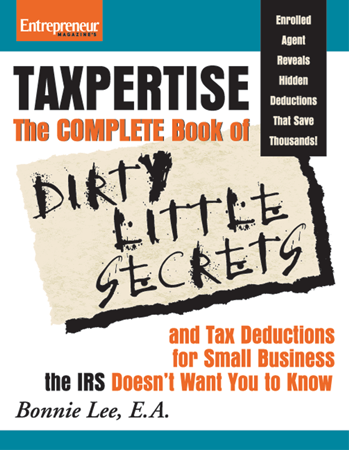When you’re self-employed filing a Schedule C with your tax return, your chances of being audited are greater than if you were a wage earner. Why? Because the IRS suspects that you will attempt to either hide income or write off personal expenses as business deductions. So when they select tax returns to audit, they cast the net wider and rake in 1.5% of self-employed folks versus 1% of W2 employees.
Here’s how you can keep them off your back:
Use a professional software accounting system. Your credibility increases in the eyes of an IRS agent if your tax return is based on professionally prepared financial statements, especially if maintained by an outside firm. You can use the same software to track your personal income and expenses as well.
Document sources of all income. If you are audited, the first thing the IRS agent will do is add up all of the deposits from your personal and business bank accounts. If more money went into the bank than was declared on your tax return, the IRS will want to know where the money came from and whether or not the income is taxable. If you use QuickBooks for your personal and business books, you will automatically tie out this income. But you still need proof. If the income you record is not taxable, e.g. gifts, inheritances, loans, transfers from personal funds, then keep a copy of the check or document that accompanies the income.
Content Continues Below
Let a professional prepare your income tax return. Self-prepared returns are more likely to be audited because the IRS believes that a nonprofessional has limited knowledge. Besides, you may find that the fee charged by an Enrolled Agent or CPA might be wiped out by the added deductions they spot for you. Tax law is complex. There are more than 14,000 pages of tax code. And if you are self-employed, no matter how small your business, your tax return is now a complex creature.
Rethink your legal form. Corporations, LLCs, and partnerships are less likely to be audited. But that should not be the sole reason to incorporate. Discuss this option with a tax professional and your attorney before deciding.
Document red flags. You are allowed to deduct all ordinary and necessary business expenses. Would you make this purchase if you didn’t have this business? If the answer is no, you probably have a deductible business expense. But it’s important to know the rules and to have proper documentation to justify the deduction. Some expenses receive considerably more scrutiny than others.
Automobile expense is a favorite area the IRS explores. Taxpayers are required to keep a mileage log, however, I have met only one client who ever did. There are ways to substantiate mileage deductions without presenting an auditor with a mileage log. Be sure to record your beginning and ending odometer reading in your appointment book on Jan 1 and again on Dec 31. If you use an appointment book or calendar, a mileage log can be reconstructed from those pages and total mileage for the year can be extrapolated from odometer readings recorded on vehicle repair receipts.
Travel, meals and entertainment are close runners up to automobile expense when it comes to scrutiny. Go to www.irs.gov and read publication 463 to determine what you can and can’t deduct. Then document the hell out of it.
Vacation destinations like Las Vegas or Hawaii should be documented with more than purchase receipts to prove business intent. Keep flyers advertising the trade show, the seminar or letters from prospective clients at that location on file to prove the validity of the deduction. If entertaining, make sure to make notes on receipts for meals and entertainment mark with name of the person entertained and a brief description of the business purpose.
More people telecommute and work from home offices than ever before. So while it has become the norm, the IRS still likes to pick this deduction apart. Take photographs of the house and the office area. This will serve two purposes: It will show the proportion of the business area versus the personal living area to substantiate the amount of space claimed and it will show that there is in fact a business area. The rule is that your home office must be your principal place of business, used exclusively and on a regular basis for business purposes.
Bonnie Lee is an Enrolled Agent admitted to practice and representing taxpayers in all fifty states at all levels within the Internal Revenue Service. Lee founded Symmetry Business Services in 1982 to represent taxpayers in audits, offers in compromise, tax problem resolution, tax preparation, tax planning, and to help non-filers safely re-enter the tax system. As an outgrowth of her work with her growing clientele and her dedication to demystifying taxes for real people everywhere, Lee launched the Taxpertise ™ seminar program, her Taxpertise ™ radio show on KSVY radio in Sonoma County, California and her upcoming (July, 2009) Entrepreneur Press book, Taxpertise, The Complete Book of Dirty Little Secrets and Hidden Deductions for Small Business that the IRS Doesn’t Want You to Know. Follow Bonnie Lee on Twitter @BLTaxpertise or email her at bonnie@taxpertise.com . Live stream her radio show every Tuesday at 1:00 PST by going to KSVY.org and clicking on Listen Now.



